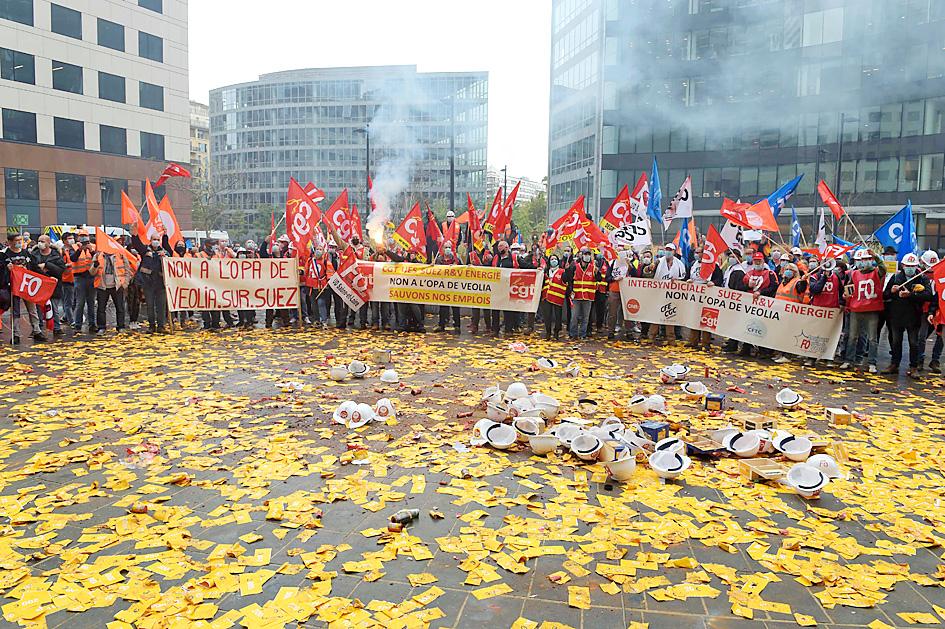French Minister of Finance Bruno Le Maire yesterday said that a takeover raid by French energy and water giant Veolia Environment SA against its rival Suez SA risked destabilizing both firms unless an amicable accord could be reached.
Veolia closed in on its target on Monday after securing a deal to buy 30 percent of Suez from Engie SA, an energy player in which the French state owns a 22 percent stake.
Despite voting against the sale, the French government was overruled by Engie’s board, which agreed to pocket Veolia’s offer of 3.4 billion euros (US$4 billion).

Photo: AFP
Veolia is now poised to launch a full takeover, potentially creating a global giant supplying power generation, waste management and water services to municipalities worldwide.
French officials are eyeing the deal warily, despite pledges by Veolia to maintain jobs in the strategic sectors.
Suez’s board on Tuesday denounced a “hostile” deal made under “unprecedented and irregular conditions.”
“I don’t believe in forced marriages. I don’t think they work,” Le Maire told France Info radio, urging talks to resume between the two sides quickly.
“The deal won’t work” without an accord, he added.
“We were just a few centimeters from a deal, but we ran up against intransigence on one side and hastiness on the other,” he said.
Veolia has said it would give itself six months to find common ground with Suez and allay its fears of a breakup that it says could cost up to 10,000 jobs.
Suez has already taken a series of “poison pill” moves to try to scupper any takeover, including by placing its key French water services business in an independent Dutch holding.
That could put it out of reach for Veolia, which has said it wants to sell the French operations to meet antitrust concerns.
Suez said that “it will use all the means at its disposal ... to avoid a creeping takeover or de facto control.”

TAKING STOCK: A Taiwanese cookware firm in Vietnam urged customers to assess inventory or place orders early so shipments can reach the US while tariffs are paused Taiwanese businesses in Vietnam are exploring alternatives after the White House imposed a 46 percent import duty on Vietnamese goods, following US President Donald Trump’s announcement of “reciprocal” tariffs on the US’ trading partners. Lo Shih-liang (羅世良), chairman of Brico Industry Co (裕茂工業), a Taiwanese company that manufactures cast iron cookware and stove components in Vietnam, said that more than 40 percent of his business was tied to the US market, describing the constant US policy shifts as an emotional roller coaster. “I work during the day and stay up all night watching the news. I’ve been following US news until 3am

UNCERTAINTY: Innolux activated a stringent supply chain management mechanism, as it did during the COVID-19 pandemic, to ensure optimal inventory levels for customers Flat-panel display makers AUO Corp (友達) and Innolux Corp (群創) yesterday said that about 12 to 20 percent of their display business is at risk of potential US tariffs and that they would relocate production or shipment destinations to mitigate the levies’ effects. US tariffs would have a direct impact of US$200 million on AUO’s revenue, company chairman Paul Peng (彭雙浪) told reporters on the sidelines of the Touch Taiwan trade show in Taipei yesterday. That would make up about 12 percent of the company’s overall revenue. To cope with the tariff uncertainty, AUO plans to allocate its production to manufacturing facilities in

Six years ago, LVMH’s billionaire CEO Bernard Arnault and US President Donald Trump cut the blue ribbon on a factory in rural Texas that would make designer handbags for Louis Vuitton, one of the world’s best-known luxury brands. However, since the high-profile opening, the factory has faced a host of problems limiting production, 11 former Louis Vuitton employees said. The site has consistently ranked among the worst-performing for Louis Vuitton globally, “significantly” underperforming other facilities, said three former Louis Vuitton workers and a senior industry source, who cited internal rankings shared with staff. The plant’s problems — which have not

COLLABORATION: Given Taiwan’s key position in global supply chains, the US firm is discussing strategies with local partners and clients to deal with global uncertainties Advanced Micro Devices Inc (AMD) yesterday said it is meeting with local ecosystem partners, including Taiwan Semiconductor Manufacturing Co (TSMC, 台積電), to discuss strategies, including long-term manufacturing, to navigate uncertainties such as US tariffs, as Taiwan occupies an important position in global supply chains. AMD chief executive officer Lisa Su (蘇姿丰) told reporters that Taiwan is an important part of the chip designer’s ecosystem and she is discussing with partners and customers in Taiwan to forge strong collaborations on different areas during this critical period. AMD has just become the first artificial-intelligence (AI) server chip customer of TSMC to utilize its advanced